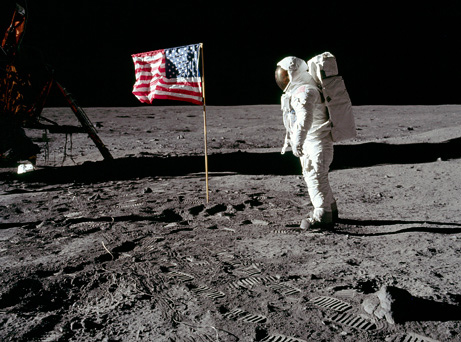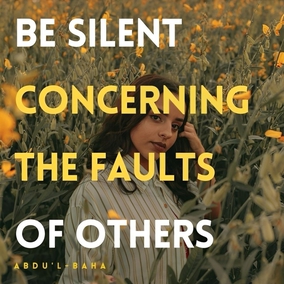The views expressed in our content reflect individual perspectives and do not represent the authoritative views of the Baha'i Faith.
fact n. a thing that has actually happened or is really true; reality, truth.
Have you ever heard of denialism? Here’s how it works: confronted with an uncomfortable reality, people choose to embrace a defense mechanism instead.
Michael Specter, the journalist and author who wrote the book about it (Denialism: How Irrational Thinking Hinders Scientific Progress, Harms the Planet, and Threatens Our Lives), defines denialism as a fear-based response: “… when an entire segment of society, often struggling with the trauma of change, turns away from reality in favor of a more comfortable lie.”
Wikipedia describes denialism as “an essentially irrational action that withholds the validation of a historical experience or event, by the person refusing to accept an empirically verifiable reality.”
 All kinds of denialists exist. Believe it or not, some people still deny we live on a globe, and insist that the Earth is flat. Holocaust deniers say that the Nazis didn’t exterminate millions of people. Moon landing deniers say it was all a hoax. Climate deniers resist the overwhelming scientific evidence that says the planet continues to heat up as a result of man-made activity. AIDS denialists say that the HIV virus has nothing to do with the disease, preferring instead to assign blame to various shadowy conspiracies. Religion denialists claim that a belief in anything beyond the physical is the functional equivalent of insanity. Evolution denialists call their unproven suppositions creationism or “intelligent design.” Denialist conspiracy theories abound, too.
All kinds of denialists exist. Believe it or not, some people still deny we live on a globe, and insist that the Earth is flat. Holocaust deniers say that the Nazis didn’t exterminate millions of people. Moon landing deniers say it was all a hoax. Climate deniers resist the overwhelming scientific evidence that says the planet continues to heat up as a result of man-made activity. AIDS denialists say that the HIV virus has nothing to do with the disease, preferring instead to assign blame to various shadowy conspiracies. Religion denialists claim that a belief in anything beyond the physical is the functional equivalent of insanity. Evolution denialists call their unproven suppositions creationism or “intelligent design.” Denialist conspiracy theories abound, too.
This kind of unreasoning, anti-scientific denial seems increasingly prevalent in our world today.
Perhaps that comes from the dizzying pace of technological change we’re experiencing; or from the rapid increase of human knowledge in general; or from the burgeoning new discoveries made by science. Maybe some people retreat to denialism because they only have access to bad or prejudiced or downright false information—poor research, fake news, unreliable studies or intentionally misleading propaganda. Education and discernment play a significant role in combatting denialism, of course, but so do street smarts and life experience. Regardless of the cause, though, denialism has proliferated.
So, in light of all this denialism, consider these basic Baha’i principles: the truth exists, and it’s our job to find it and investigate it for ourselves. The truth is one, not many. Ultimately the truth feeds, nourishes and sustains our minds and souls, while lies offer us no nutritional value whatsoever:
A man may have attained to a high degree of material progress, but without the light of truth his soul is stunted and starved. – Abdu’l-Baha, Paris Talks, p. 31.
So let’s see if we can agree on three simple premises about denialism:
- Knowing the truth is always better than believing a lie.
- A fact is a fact.
- Independently judge for yourself, and verify your own truths.
Agreed? Probably not too many people would disagree with these. But lately we have a hard time, many if not most of us, with determining what’s factual and what’s not. Here are some tips from the Baha’i teachings that can help anyone independently judge the factual truth for themselves, and avoid denialism:
1. Investigate! Never accept anything reflexively or at face value. Instead, examine the evidence yourself, and look into any claims of truth with skepticism:
Let us examine the facts as they are, investigate the truth and reality in order to arrive at a true opinion and conclusion. – Abdu’l-Baha, Foundations of World Unity, p. 96.
2. Reason and research! When you come across a claim, use your inductive reasoning powers and your ability to research that claim before you accept it. Be scientific about what you believe, and anchor your beliefs on a firm foundation, not on shaky ground:
The man of science is perceiving and endowed with vision, whereas he who is ignorant and neglectful of this development is blind. The investigating mind is attentive, alive; the callous and indifferent mind is deaf and dead. A scientific man is a true index and representative of humanity, for through processes of inductive reasoning and research he is informed of all that appertains to humanity, its status, conditions and happenings. He studies the human body politic, understands social problems and weaves the web and texture of civilization. In fact, science may be likened to a mirror wherein the infinite forms and images of existing things are revealed and reflected. It is the very foundation of all individual and national development. Without this basis of investigation, development is impossible. Therefore, seek with diligent endeavor the knowledge and attainment of all that lies within the power of this wonderful bestowal. – Abdu’l-Baha, The Promulgation of Universal Peace, p. 50.
3. Don’t believe what you can’t confirm! Try, as hard as you can, to unite your thoughts, beliefs and emotions. In matters of religion—which include all of your most cherished beliefs—don’t accept superstition:
Religion must stand the analysis of reason. It must agree with scientific fact and proof so that science will sanction religion and religion fortify science. Both are indissolubly welded and joined in reality. If statements and teachings of religion are found to be unreasonable and contrary to science, they are outcomes of superstition and imagination.
How can man believe that which he knows to be opposed to reason? Is this possible? Can the heart accept that which reason denies? – Abdu’l-Baha, The Promulgation of Universal Peace, pp. 175, 231.
You May Also Like
Comments

















The existence of gays has not been "denied" by anyone. The very fact that there is a "subject of boys" proves it. :-)
You may find this helpful:
https://en.wikipedia.org/wiki/Denialism